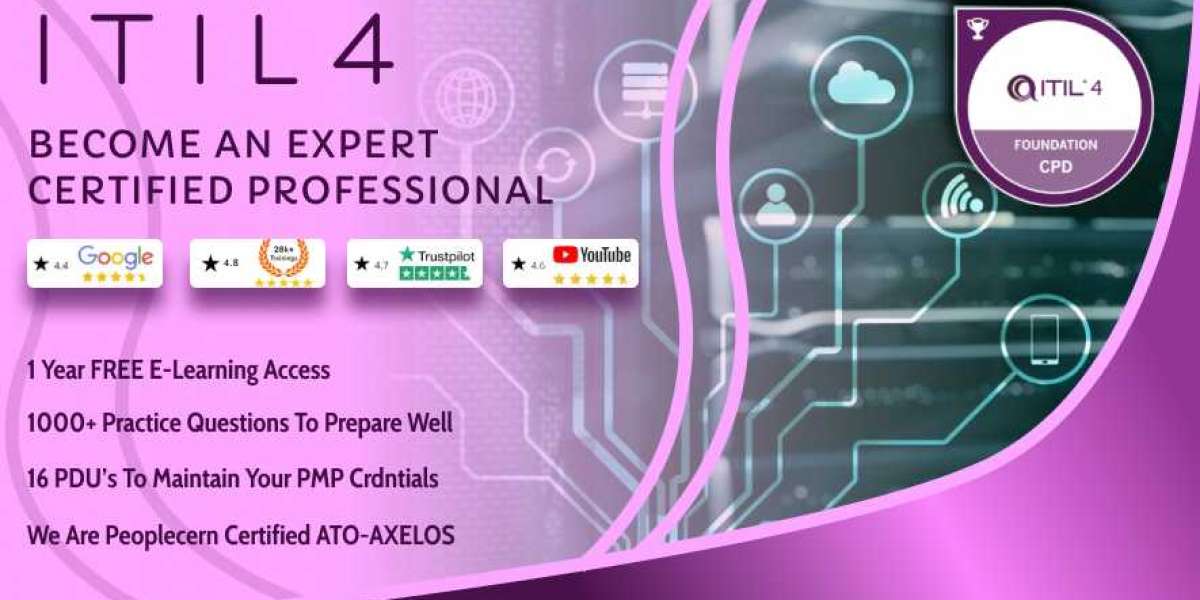Introduction:
In today's fast-paced digital landscape, organizations across industries are constantly striving to improve their IT service management (ITSM) practices to stay competitive and meet evolving customer demands. IT Infrastructure Library (ITIL) has long been recognized as a leading framework for ITSM, providing a structured approach to delivering and managing IT services. With the release of ITIL 4, there's been a significant evolution in IT service management practices, prompting professionals to seek ITIL 4 certification to stay relevant and advance their careers. In this comprehensive guide, we delve into everything you need to know about ITIL 4 certification – from its fundamentals to its benefits and beyond.
Understanding ITIL 4:
ITIL, initially developed by the UK Government's Central Computer and Telecommunications Agency (CCTA) in the 1980s, has undergone several revisions to adapt to changing business environments and technological advancements. ITIL certification, the latest iteration, was introduced in 2019, with a renewed focus on the broader context of customer experience, value streams, and digital transformation. Unlike its predecessor, ITIL v3, which followed a more process-oriented approach, ITIL 4 emphasizes the importance of integrating ITSM with agile, DevOps, and lean practices.
Key Components of ITIL 4:
ITIL 4 introduces several new concepts and practices aimed at helping organizations navigate the complexities of modern IT service delivery. Some of the key components of ITIL 4 include:
Service Value System (SVS): The SVS represents the holistic approach to service management in ITIL 4, incorporating various components such as guiding principles, governance, service value chain, and continual improvement.
Four Dimensions Model: This model expands the traditional scope of ITIL by introducing four dimensions – Organizations and People, Information and Technology, Partners and Suppliers, and Value Streams and Processes – that influence service management practices.
Guiding Principles: ITIL 4 defines seven guiding principles that serve as the foundation for decision-making and actions within an organization, including focus on value, start where you are, progress iteratively with feedback, and collaborate and promote visibility.
Service Value Chain: The service value chain outlines the series of activities required to create value for customers, including plan, engage, design and transition, obtain/build, deliver and support, and improve.
Practices: ITIL 4 introduces 34 management practices categorized into three groups – general management practices, service management practices, and technical management practices – covering a wide range of activities such as incident management, change control, and service level management.
Benefits of ITIL 4 Certification:
Earning ITIL 4 certification offers numerous benefits for both individuals and organizations looking to enhance their ITSM capabilities and drive business value:
Enhanced Skills and Knowledge: ITIL 4 certification equips professionals with the latest ITSM best practices, frameworks, and methodologies, empowering them to deliver high-quality IT services aligned with organizational objectives.
Improved Career Opportunities: As ITIL 4 becomes increasingly adopted by organizations worldwide, certified professionals are in high demand across various industries, opening up new career opportunities and higher earning potential.
Organizational Efficiency: By implementing ITIL 4 principles and practices, organizations can streamline their ITSM processes, improve service quality, minimize downtime, and enhance overall operational efficiency.
Better Customer Satisfaction: ITIL 4 emphasizes the importance of delivering value to customers through efficient service delivery and continuous improvement, ultimately leading to higher levels of customer satisfaction and loyalty.
Alignment with Business Goals: ITIL 4 helps bridge the gap between IT and business objectives by aligning ITSM practices with broader organizational goals, enabling better decision-making and resource allocation.
ITIL 4 Certification Levels:
ITIL 4 offers a streamlined certification scheme consisting of four levels, each catering to different roles and proficiency levels:
ITIL 4 Foundation: The entry-level certification provides candidates with a basic understanding of the key concepts, principles, and terminology of ITIL 4. It is ideal for individuals new to IT service management or those seeking foundational knowledge.
ITIL 4 Managing Professional (MP): The Managing Professional stream is designed for IT practitioners involved in the operation, planning, and optimization of IT services and infrastructure. It comprises four modules:
- ITIL 4 Specialist: Create, Deliver Support
- ITIL 4 Specialist: Drive Stakeholder Value
- ITIL 4 Specialist: High-Velocity IT
- ITIL 4 Strategist: Direct, Plan Improve
ITIL 4 Strategic Leader (SL): The Strategic Leader stream targets IT and business leaders responsible for shaping ITSM strategies and driving organizational change. It consists of two modules:
- ITIL 4 Strategist: Direct, Plan Improve
- ITIL 4 Leader: Digital IT Strategy
ITIL 4 Master: The highest level of ITIL certification, ITIL 4 Master, validates the candidate's ability to apply ITIL principles, methods, and techniques in real-world scenarios. It requires candidates to demonstrate extensive experience and expertise in ITSM practices.
Preparing for ITIL 4 Certification:
Achieving ITIL 4 certification requires adequate preparation and study. Here are some tips to help you succeed:
Understand the Exam Format: Familiarize yourself with the format, structure, and objectives of the ITIL 4 certification exam. Practice sample questions and simulations to get a feel for the exam environment.
Study the Official Material: Utilize official ITIL 4 publications, study guides, and resources provided by accredited training providers to cover the exam syllabus comprehensively.
Enroll in Training Courses: Consider enrolling in accredited ITIL 4 training courses offered by certified training providers. These courses typically include instructor-led training, e-learning modules, practice exams, and study aids.
Practice Continuously: Regularly review and reinforce your understanding of ITIL 4 concepts and practices through self-assessment quizzes, practice exams, and hands-on exercises.
Join Study Groups: Engage with peers and fellow IT professionals through study groups, forums, and online communities to exchange knowledge, tips, and study resources.
Stay Updated: Keep abreast of the latest developments, updates, and revisions to the ITIL 4 framework and certification scheme to ensure your knowledge remains current and relevant.
Conclusion:
ITIL 4 certification serves as a valuable asset for IT professionals seeking to enhance their skills, advance their careers, and contribute to organizational success in today's digital age. By embracing the principles, practices, and methodologies outlined in ITIL 4, individuals and organizations can drive continuous improvement, deliver superior IT services, and achieve sustainable business outcomes. Whether you're new to IT service management or a seasoned practitioner, ITIL 4 certification offers a pathway to professional growth, innovation, and excellence in ITSM practices.
In a rapidly evolving IT landscape, staying ahead of the curve is essential for success. By investing in ITIL 4 certification, you're not only investing in your own future but also in the future success of your organization. So, seize the opportunity, embark on your ITIL 4 certification journey, and unlock new possibilities in IT service management and beyond.








